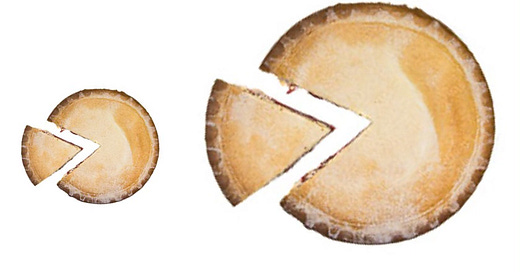Has America’s ability to compromise been compromised?
It's okay, though. Being collaborative is more important than compromise anyway.
Updated Bridge Grades for the 119th Congress are coming this summer. Subscribe (free) to be the first to get public access.
One of the most common objections I hear about Bridge Grades (and more broadly the notion of dropping partisan identity and electing collaborative bridgers regardless of party) is the legitimate objection against “compromising with crazy.”
We agree.
Collaborative governance is not about compromising with the other side, or splitting the difference. It’s about finding overlapping common interests, looking past ideological differences, and then doing something about it together.
To compromise or not to compromise?
Last June, Supreme Court justice Samuel Alito was recorded on a hot mic saying “There can be a way of working, a way of living together peacefully (as Americans), but it’s difficult, you know, because there are differences on fundamental things that really can’t be compromised.”
This doozy came from one of the nine top judges in our land.
In the meantime, Georgetown’s “Battleground Poll” from November 2024 yielded a stunning result that 82% of Americans say “it will be good for the country if President Trump and Congress compromise to find solutions even if this means I will not always get everything I want.”
But, compromise can be a sucker’s choice in a zero-sum game
Compromise is a loaded term, though. Consider that when a group has been infiltrated by an outsider, it is said to have been “compromised.” Or, when someone wants to blackmail an adversary, it’s best to catch them in a “compromising” position.
In politics, compromise has become a dirty word. In today’s toxic blue-v-red tug-of-war, giving an inch means ceding an inch. To compromise is to yield. To give up hard-earned territory means losing it to the other side.
This is what’s known as a zero-sum game: whatever I win, you lose and whenever you win, I lose. The size of the pie is fixed, and we are just fighting over how it gets sliced, and who gets to slice it.
As every kid with a sibling in the world already knows, the fairest way to share a pie of fixed size is the age-old game of “You cut, I choose.” But, in politics, the majority party takes the position of “I cut, I choose.”
Compromise in politics doesn’t work because Americans view politicians as a zero-sum game. As such, neither side wants their partisan leaders to compromise. Rather, we hope that the other side concedes and compromises to our way of thinking.
Collaboration for win-wins does not require compromise
But, our world is not a fixed sized pie. We’ve just lost the art of constructing win-win solutions.
As such, let’s drop the ideal of compromise and replace it with more productive concepts. Collaboration. Coalition building. Consensus solutions. These traits don’t require compromise of values or beliefs. On the contrary, to find a consensus solution means to find a win-win with something in it for both sides. This is about value-creation where I get what I want AND you get what you want.
I remind you that 82% of Americans think we will collectively benefit from more of this in our political leaders.
But, how to encourage our representatives to pursue win-win legislation?
A way forward for our common interests
We must rethink how we we choose our political leaders aside from the color saturation of their their respective red or blue flags. As citizens, we’ll do better for ourselves by electing consensus builders from both parties to sit at the big table together.
Specifically, we must elect politicians (from both parties) who don’t view the pie as fixed and fight to slice the zero-sum pie to the benefit of their own side. Instead, let’s identify and elect political leaders who fight to increase the size of the pie, rather than bullying for the largest slice.
We call such leaders bridgers, not dividers, and Bridge Grades uses objective data to identify them within both parties. These bridgers are out there. Bridge Grades is able to find them.
See for yourself. Check out Bridge Grades from last 118th Congressional term. It’s all here.
Want to be the first to see Bridge Grades for the current 119th Congress? Just subscribe (free). We will release mid-term grades for the 119th Congress when we have mid-term results and you’ll be the first to know.
Bridge Grades is a non-ideological report card for politicians. Using 3rd party data, we grade politicians on their abilities to collaborate and build consensus solutions for the common interests of multiple parties versus how polarizing they behave. In aggregating data from multiple non-partisan 3rd party sources, Bridge Grade is like Rotten Tomatoes for politicians. Bridge Grades measure not “what” a politician thinks, but rather “how” the politician behaves. Independent of red or blue ideology, Bridge Grades objectively sorts bridgers from dividers.






'Collaboration' should be a major point of emphasis for voters (and politicians alike) as we head toward future elections. Glad someone is highlighting this need and hope this gains traction among voters.